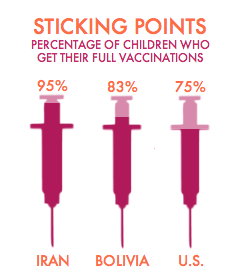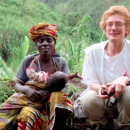
May 24, 2013 | Health and Well-Being
How to Make the World Just a Little Bit Better
The president of Doctors Without Borders shares five lessons from the front lines of war.

Dr. Deane Marchbein with a local woman on the road to Masisi in the Democratic Republic of Congo.
When Deane Marchbein was 10 years old, she thought the most important job in the world was being a mother. She still does, but as she grew older this Bostonian added another goal to her wish list: to work with Doctors Without Borders (or MSF, to use its initials from its founding in France as Medecins Sans Frontieres). She achieved that in 2006, joining as an anesthesiologist. Since 2012 she has been president of MSF, which works in nearly 70 countries providing medical aid to those most in need. Here, Dr. Marchbein, who has served in Democratic Republic of Congo, Ivory Coast, Haiti, Libya, Nigeria and South Sudan, shares the lessons from her far-flung experience.
1. The simplest things can make a huge difference.
"My first experience with MSF was on the Ivory Coast, and it was very powerful. In my hospital, children were dying from burns that would not be fatal in the U.S, and I realized that part of the problem was that the children were just scattered around the hospital wards. I noticed a room that was not being used, so I started keeping all my burn patients there. As a result, mortality went back to where it should have been, which was basically zero."
2. How not to sweat the small stuff.
"Last year I was in Lebanon working on a supply project for Syria. People were literally walking over the mountains barefoot in the winter to escape Syria. When we first got to Syria, we were doing trauma surgery in a house, a cave, on a chicken farm. Dealing the way that we do with such stark limits gives you a very different perspective of life's little irritations."
3. To gain trust, drop the politics.
"There are times in culturally conservative countries when the men in power refuse to deal with a woman or say things like, 'We can't make sure a woman can be safe.' But MSF tends to push the limits. I've found if you're respectful of traditions while being persistent and insistent, people realize that you're there to help and not to change their culture."
4. Syria: Investigate before you donate.
"Syria is a huge challenge. There is a very big need for women's and children's health care, women who need cesarean sections. Syria had a great health system, but it has fallen. People who have chronic diseases such as cancer and diabetes really have no place to go. There is a real imbalance, and a lot of misinformation. You hear about all of this aid being sent to Syria, but most NGO's only deal directly with the government, so the aid may never get to the people who need it. There is a big problem of imbalance."
5. Your definition of community is the one that counts.
"My goal has always been to make things a little bit better for people, find collaborators and be persistent. It's about building a community to do something. Make the world better for the people around you, however you define your community."
To learn more about Doctors Without Borders/Médecins Sans Frontières (MSF), click here.